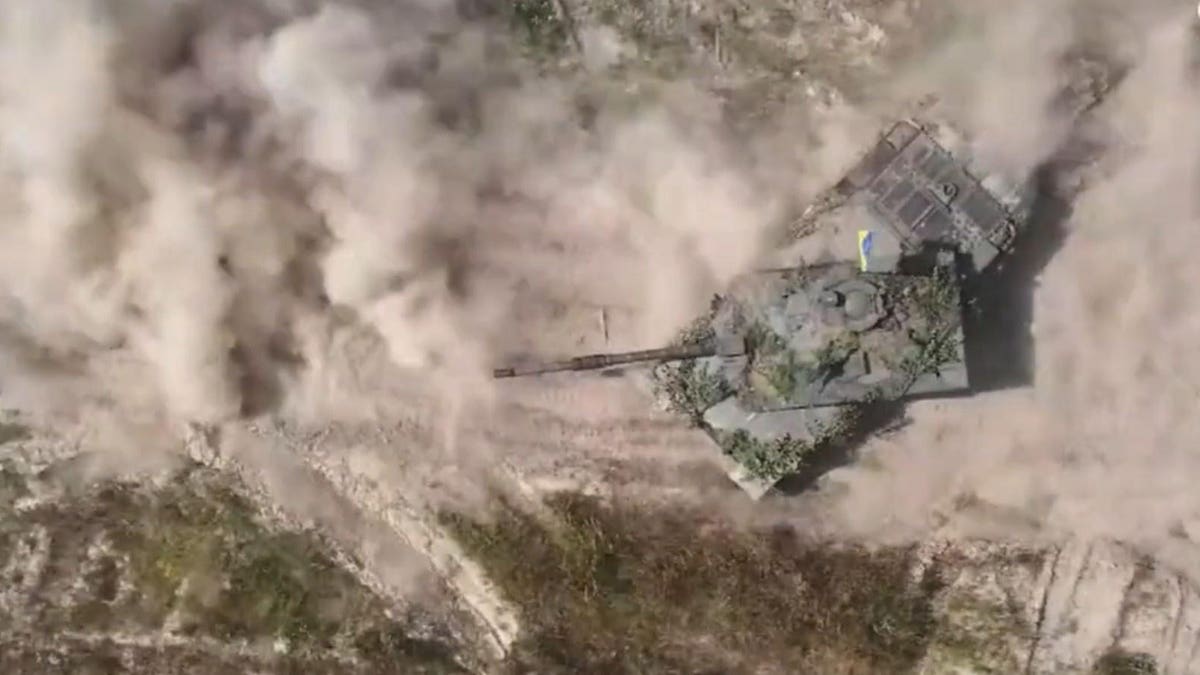It seems the Ukrainian armed forces have lost their first Challenger 2 tank. A video that circulated online on Monday depicts what appears to be one of the 82nd Air Assault Brigade’s ex-British Challengers 2 in flames on a roadside outside Robotyne, in southern Ukraine’s Zaporizhzhia Oblast.
The apparent first loss of a 69-ton, four-person Challenger 2, out of 14 that the United Kingdom pledged to the Ukrainian war effort back in January, comes just days after the Ukrainian defense ministry highlighted the tank in a video interview with an 82nd Brigade trooper.
The soldier praised the Challenger 2 for its long-range firepower and excellent protection compared to Soviet-style tanks. We still haven’t seen footage of the 82nd Brigade’s Challenger 2s firing their 120-millimeter rifled guns in anger in Ukraine, but the Monday video of the burning Challenger 2 ironically does highlight the tanks’ survivability.
That’s because the burning Challenger 2’s turret still is attached to its hull.
One of the major weaknesses of a Soviet-designed T-72, T-80 or T-90 is that the three-person tanks—they have autoloaders for their main guns instead of a fourth crewman who manually handles ammunition—stow their ammo in a ring underneath the turret.
When a T-72 takes a direct hit and its ammo cooks off, the tank tends to explode like a firework. The turret and its occupants as often as not launch right off the hull. “You’re sent flying somewhere in the fields,” the 82nd Brigade tanker, a former T-80 crewman, mused in his interview. “You don’t stand much of a chance.”
By contrast, the Challenger 2 like most Western tanks stows its ammo in special compartments along the turret that explode outward, away from the crew, when struck. “Everything here is designed for the people,” the tanker explained.
We don’t know what misfortune befell the Challenger 2 that burned on that road outside Robotyne. But we do know the 82nd Brigade and its sister unit, the 46th Air Mobile Brigade, steadily are advancing from liberated Robotyne southeast toward Verbove. Their ultimate objective, Russian-occupied Melitopol, lies 50 miles to the south along the T0408/T0401 highway.
According to the 82nd Brigade tanker, the Ukrainians prefer to use their 14—now 13—Challenger 2s as long-range fire-support, fully taking advantage of their excellent day-night optics, precise fire-controls and powerful main guns firing tungsten penetrators two miles out or farther. “It’s a machine designed to operate at a long distance.”
But when the battalions they’re supporting are advancing, the tanks have no choice but to move out in order to keep up.
It’s apparent the Russians caught that Challenger 2 on the road, far from any concealment. If the Challenger 2 loss is at all similar to previous losses of German-made Leopard 2 tanks in Ukrainian service, it’s possible the ex-British tank struck a mine or got immobilized by artillery—and then explosives-laden drones zeroed in to finish it off.
Don’t shed a tear for the tank. “It’s impossible to entirely avoid armor losses, especially due to the enemy’s advantage in the air,” Ukrainian soldier Olexandr Solon’ko wrote. “However, armor serves a specific purpose that entails risks. These actions are justified by the fact that they save lives.”
“You can replace a piece of metal, even if it’s expensive, but you can’t repair a human life.”
Take comfort that, three months into Ukraine’s counteroffensive, the Ukrainians have lost just six of their 105 Western-made tanks: five of 71 Leopard 2s and one of 14 Challenger 2s. None of the 20 delivered Leopard 1A5s yet have been destroyed.
And many more tanks are en route to Ukraine as the counteroffensive grinds on. Fourteen more Leopard 2s, 31 American-made M-1s and perhaps another 145 Leopard 1A5s.
Yes, Ukraine is losing tanks, including some of its best tanks. No, it’s not running out of tanks.
Read the full article here





